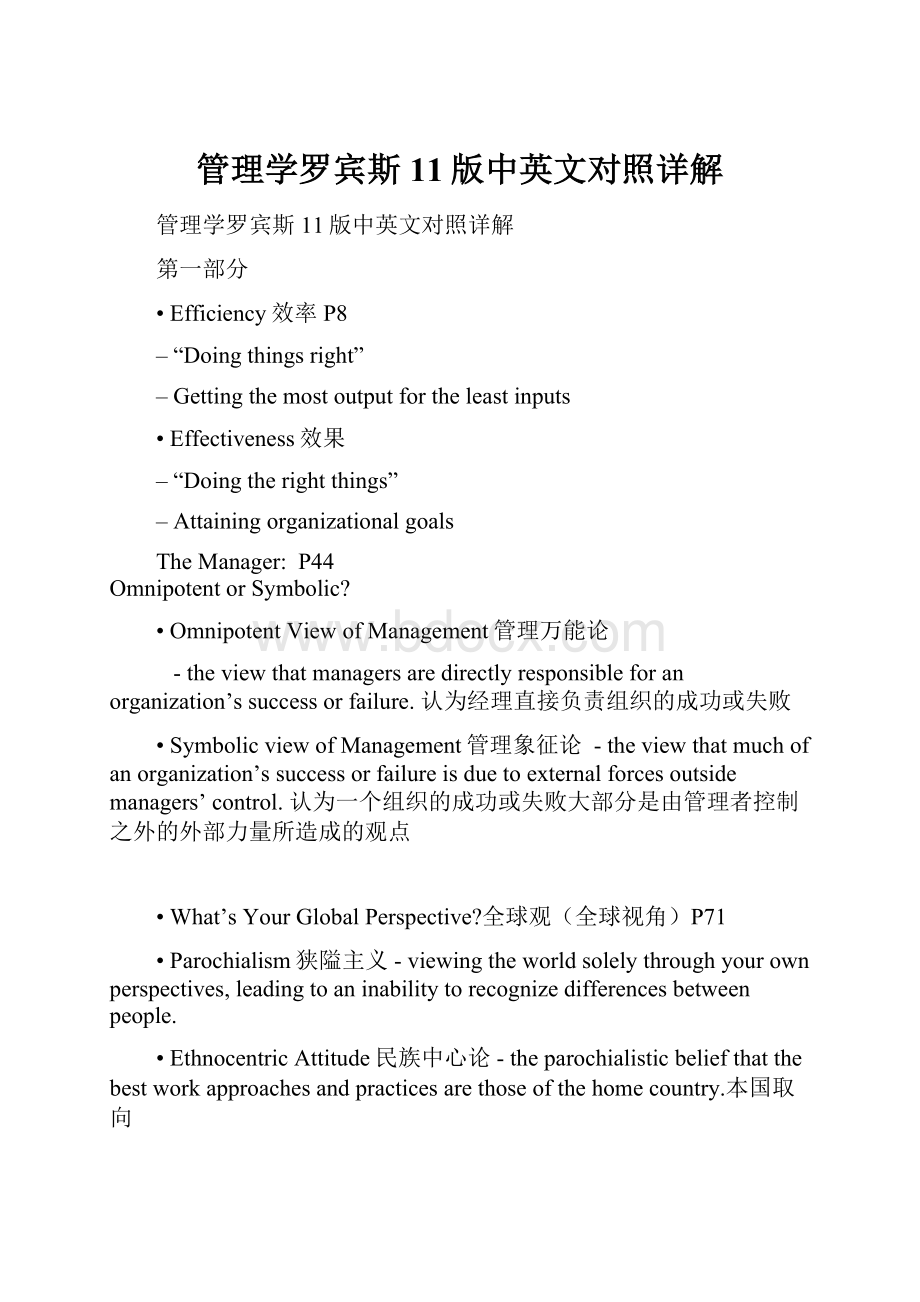管理学罗宾斯11版中英文对照详解.docx
《管理学罗宾斯11版中英文对照详解.docx》由会员分享,可在线阅读,更多相关《管理学罗宾斯11版中英文对照详解.docx(8页珍藏版)》请在冰豆网上搜索。

管理学罗宾斯11版中英文对照详解
管理学罗宾斯11版中英文对照详解
第一部分
•Efficiency效率P8
–“Doingthingsright”
–Gettingthemostoutputfortheleastinputs
•Effectiveness效果
–“Doingtherightthings”
–Attainingorganizationalgoals
TheManager:
P44
OmnipotentorSymbolic?
•OmnipotentViewofManagement管理万能论
-theviewthatmanagersaredirectlyresponsibleforanorganization’ssuccessorfailure.认为经理直接负责组织的成功或失败
•SymbolicviewofManagement管理象征论-theviewthatmuchofanorganization’ssuccessorfailureisduetoexternalforcesoutsidemanagers’control.认为一个组织的成功或失败大部分是由管理者控制之外的外部力量所造成的观点
•What’sYourGlobalPerspective?
全球观(全球视角)P71
•Parochialism狭隘主义-viewingtheworldsolelythroughyourownperspectives,leadingtoaninabilitytorecognizedifferencesbetweenpeople.
•EthnocentricAttitude民族中心论-theparochialisticbeliefthatthebestworkapproachesandpracticesarethoseofthehomecountry.本国取向
•PolycentricAttitude多国论-theviewthatthemanagersinthehostcountryknowthebestworkapproachesandpracticesforrunningtheirbusiness.东道国取向
•GeocentricAttitude全球中心论–aworld-orientedviewthatfocusesonusingthebestapproachesandpeoplefromaroundtheglobe.全球取向
•MultinationalCorporation(MNC)跨国公司-abroadtermthatreferstoanyandalltypesofinternationalcompaniesthatmaintainoperationsinmultiplecountries.任一或所有类型的在多国维持经营的国际性公司。
•TheDecisionMakingProcess决策制定过程P179
•Identifyingaproblem识别决策问题
•Identifyingdecisioncriteria确认决策标准
•Allocatingweightstothecriteria为决策标准分配权重
•Developingalternatives开发备选方案
•Analyzingalternatives分析备选方案
•Selectinganalternative确定实施方案
•Implementingthealternatives实施方案
•Evaluatingdecisioneffectiveness评估决策结果
Problem问题-anobstacle(障碍)thatmakesitdifficulttoachieveadesiredgoalorpurpose.
•WhyDoManagersPlan?
为什么管理者要制定计划
•PurposesofPlanning计划的目的
–Providesdirection给出方向
–Reducesuncertainty降低不确定性
–Minimizeswasteandredundancy减少重复和浪费
–Setsthestandardsforcontrolling便于控制
Mission:
使命P227
astatementofthepurposeofanorganization对组织目的的声明
•Thescopeofitsproductsandservices其产品和服务的范围
•OrganizationalDesign-aprocessinvolvingdecisionsaboutsixkeyelements:
组织结构设计的六大基本要素P265
•Workspecialization工作专门化
•Departmentalization部门化
•Chainofcommand指挥链
•Spanofcontrol管理跨度
•Centralizationanddecentralization集权与分权
•Formalization正规化
•WhatIsCommunication?
P405
•Communication沟通-thetransferandunderstandingofmeaning.意义的传递和理解
•Transfermeansthemessagewasreceivedinaformthatcanbeinterpretedbythereceiver.
•Understandingthemessageisnotthesameasthereceiveragreeingwiththemessage.
•InterpersonalCommunication人际沟通-communicationbetweentwoormorepeople.主要指存在于两人或多人之间的沟通;
•OrganizationalCommunication组织沟通-allthepatterns,networks,andsystemsofcommunicationswithinanorganization.主要指组织中沟通的各种方式、网络和系统。
•WhatIsMotivation?
什么是动机P430
•Motivation动机-theprocessbywhichaperson’seffortsareenergized,directed,andsustainedtowardattainingagoal.个体为实现目标而付出努力的强度、方向和坚持性
•Maslow’sHierarchyofNeedsTheory马斯洛的需要层次理论:
•Hierarchyofneedstheory需要层次理论-Maslow’stheorythathumanneeds—physiological生理需要,safety安全需要,social社交需要,esteem尊重需要,andself-actualization自我实现需要—formasortofhierarchy。
•五种需要可以分为低级和高级两个部分。
•每个人都有五种层次的需要,这是一个由低到高的、循序渐进的、循环往复的过程。
•每个需要层次必须得到实质的满足后才会激活下一个目标,更高一级的需要才会成为主导需要。
•每个个体在同一时间上只可能有一个层次上的主导需要。
•低级需要通过外部得到满足,高级需要通过内部得到满足。
第二部分精准掌握
Managementskills管理技能P13
•Technicalskills技术技能
–Knowledgeandproficiencyinaspecificfield
•Humanskills人际技能
–Theabilitytoworkwellwithotherpeople
•Conceptualskills概念技能
–Theabilitytothinkandconceptualizeaboutabstractandcomplexsituationsconcerningtheorganization
•Stakeholders利益相关者P50-anyconstituenciesintheorganization’senvironmentthatareaffectedbyanorganization’sdecisionsandactions.
•OrganizationalCulture组织文化P52-Thesharedvalues,principles,traditions,andwaysofdoingthingsthatinfluencethewayorganizationalmembersact.组织成员共有的影响其行动的价值观、行为准则、传统习俗和做事的方式
•StrongCultures强文化-Organizationalculturesinwhichkeyvaluesareintenselyheldandwidelyshared.重点价值被强烈拥有和广泛共享的组织文化
•Socialresponsibility社会责任P125-Abussiness’sintention,beyonditslegalandeconomicobligations,todotherightthingsandactinwaysthataregoodforsociety企业的是一种意图:
它超越了法律和经济的义务,做正确的事情,按照对社会有益的方式行动。
•escalationofcommitment承诺升级P184
Anincreasedcommitmenttoapreviousdecisiondespiteevidenceitmayhavebeenwrong.一种在过去决策基础上不断增加承诺和投入的现象,哪怕有证据表明已经作出的决策是错误的。
•TypesofProblemsP186
•StructuredProblems结构化问题-straightforward,familiar,andeasilydefinedproblems.
UnstructuredProblems非结构化问题-problemsthatareneworunusualandforwhichinformationisambiguousorincomplete
•StrategicPlans战略计划P207
-PlansthatapplytotheentIreorganizationandestablishtheorganization’soverallgoals适用于整个组织,建立组织的总体目标的计划
•Corecompetencies核心能力P228
•-theorganization’smajorvalue-creatingcapabilitiesthatdetermineitscompetitiveweapons.组织的主要的创造价值的,决定它的竞争武器的能力
第三部分理解
•ContingencyFactorsinPlanning影响计划工作的权变因素:
P211
•Manager’slevelintheorganization组织的层次
•Degreeofenvironmentaluncertainty环境的不确定性
•Lengthoffuturecommitments计划工作的时间框架
•ContingencyFactorsaffectingstructuralchoice影响组织选择的权变因素P274
•StrategyandStructure策略
•SizeandStructure规模
•TechnologyandStructure技术
•EnvironmentalUncertaintyandStructure环境不确定性
•Mechanisticorganizationalstructurestendtobemosteffectiveinstableandsimpleenvironments.机械式组织
•Theflexibilityoforganicorganizationalstructuresisbettersuitedfordynamicandcomplexenvironments.有机式组织
•Characteristicsofeffectiveteams有效团队的特征
Cleargoals目标明确,unifiedcommitment一致的承诺,appropriateleadership合适领导力,relevantskills相关技能,mutualtrust相互信赖,goodcommunication良好的沟通能力,negotiatingskills谈判技能,internalandexternalsupport内外在支持
•UnderstandingSocialNetworksP363
•Communicationprocesscontains7elementsP422
First,asender(发送者)hasamessage.Amessage(信息)isapurposetobeconveyed.Encodingconvertsamessageintosymbols.Achannelisthemedium(媒介)amessagetravelsalong.Decoding(解码)happenswhenthereceiver(接受者)retranslatesasender’smessage.Finally,feedback(反馈)occurs.
•WhoAreLeadersand
WhatIsLeadership?
谁是领导者,什么是领导P460
•Leader领导者-Someonewhocaninfluenceothersandwhohasmanagerialauthority.能够影响他人并拥有职权的人。
•Leadership领导-Whatleadersdo;theprocessofinfluencingagrouptoachievegoals.影响群体实现目标的过程
•领导者要有下属和追随者
•领导者拥有影响他人的能力和力量
•领导者通过影响他人来达到组织的目标
•影响他人的能力和力量:
他人所必需依赖的、稀缺的、无法替代的资源。
也可以表现为权力。
•Ideally,allmanagersshouldbeleaders.管理者应该是领导者
•WhatIsControlling?
P486
Controlling控制-theprocessofmonitoring,comparing,andcorrectingworkperformance监视各项活动以保证它们按计划进行并纠正各种重要偏差的过程。
Planning-ControllingLink
案例分析激励理论
计算题线性规划法决策树法